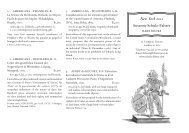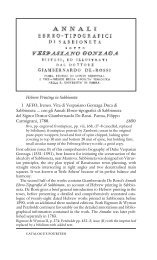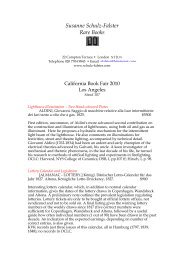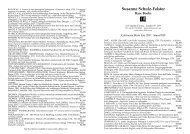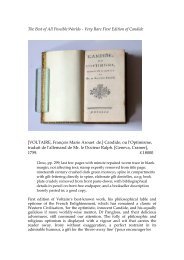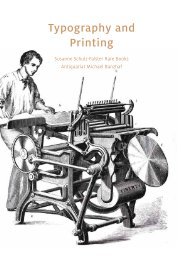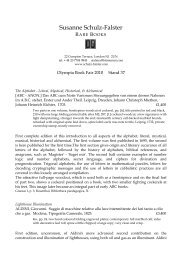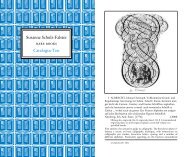«Merge Record #»«Title» - Schulz-Falster Rare Books
«Merge Record #»«Title» - Schulz-Falster Rare Books
«Merge Record #»«Title» - Schulz-Falster Rare Books
You also want an ePaper? Increase the reach of your titles
YUMPU automatically turns print PDFs into web optimized ePapers that Google loves.
VICO, Giambattista. Principj di Scienza Nuova … d'Intorno alla<br />
Comune Natura delle Nazioni in questa terza impressione dal<br />
medesimo Autore in un gran numero di luoghi Corretta, Schiarita, e<br />
notabilment Accresciuta.Tomo I [-Tomo II]. Naples, Stamperia<br />
Muziana, 1744. £ 3800<br />
Two volumes bound in one, 8vo, pp. [ii] frontispiece portrait, [xvi], [ii]<br />
allegoric engraved frontispiece, 376, one folding printed table bound in;<br />
[377]-526 [vere 516], [4] index; engraved title vignette; a few signatures<br />
lightly browned, due to paper stock, and faint marginal damp-stain to<br />
first signature; contemporary paste-paper covered boards, spine label<br />
lettered in manuscript; corners a little bumped, but in all a very good<br />
copy.<br />
Third and definitive edition of Vico's masterpiece, which had originally been<br />
published in 1725, rewritten for the second edition (1730), and further extensively<br />
revised for this one. Ahead of his time, Vico was neglected during his life and<br />
forgotten for years after his death, but his Scienza Nuova laid the foundations for<br />
many of the most important intellectual developments of the following two<br />
centuries. It was in this definitive edition, published in the year of Vico's death, that<br />
his ideas became known.<br />
The Principi di una Scienza Nuova has been justly called 'the vehicle by which the<br />
concept of historical development at last entered the thought of western Europe'<br />
(PMM 184). It remains one of the most influential treatises in the history of ideas. The<br />
concept of a history of human ideas, the principles of a universal history and its<br />
philosophical criticism, a recognition of the importance of social classes all begin<br />
with Vico. Vico was the first to formulate a systematic method for historical<br />
research. He revived the Greek conception that the course of history was subject to<br />
cyclical phases (corsi e ricorsi). This however did not indicate an upward or forward<br />
move towards perfection: according to Vico there exists in history a pattern which<br />
repeats itself in each civilisation, a storia ideale eterna. Just as the individual man<br />
passes through successive states, so does the history of civilisation.<br />
Vico recognised the importance of myth, tradition, and language for our<br />
understanding of primitive people. His was the first comprehensive study of human<br />
society before Comte, and he presented the first detailed analysis of the class struggle<br />
prior to Marx. Vico's concept of recurring patterns or cycles in history greatly<br />
influenced Joyce whose cyclical novel Finnegans Wake presents an elaborate history<br />
of mankind. In an obvious acknowledgement, Joyce even named the stage manager<br />
of his panorama John Baptister Vickar, and Samuel Beckett's seminal essay on Joyce,<br />
published in 1929, was entitled 'Dante ... Bruno . Vico .. Joyce'.<br />
Vico founded no school and though his book was well-known in Italy during his<br />
lifetime, his achievement met with little success and understanding until the<br />
nineteenth century, when the German Romantics turned to his ideas. Herder,<br />
Goethe, Hegel and later Spengler took up his contributions to historical philosophy<br />
and method, and through them he greatly influenced modern historical and<br />
sociological research, though often unacknowledged. Sir Herbert Read sums this up





